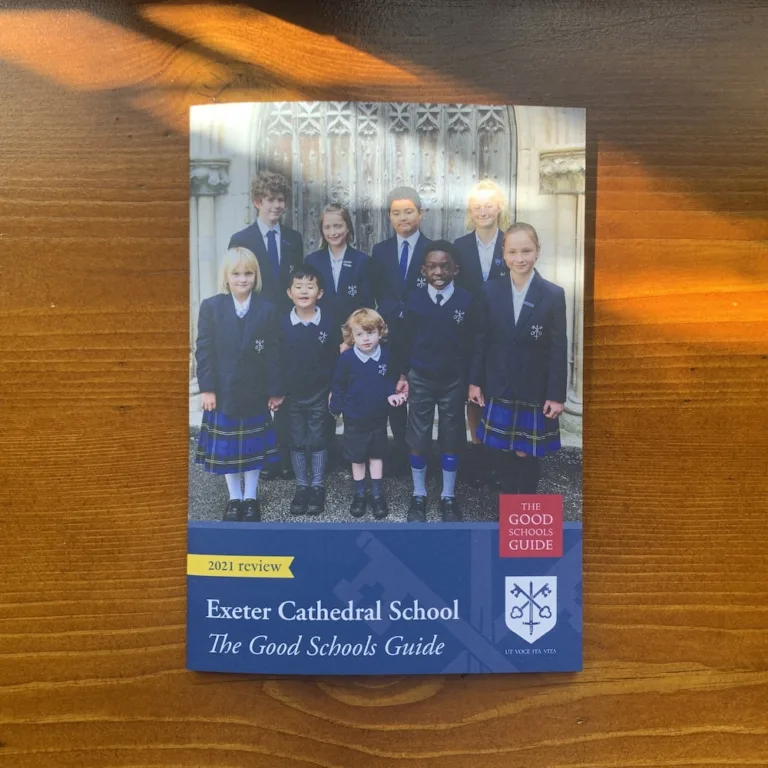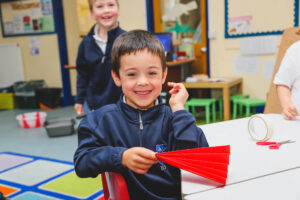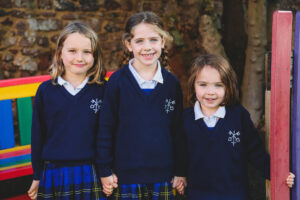The Good Schools Guide is the UK’s number one school guide, helping parents in every aspect of choosing the best education for their children.
Trusted by parents for 35 years, the guides include impartial and candid school reviews as well as in-depth articles on education-related issues. Reviews are available in print, online to subscribers or through The Good Schools Guide’s expert consultants.
The Good Schools Guide is independent, forthright, well-informed and unbiased, which gives it unique authority and has earned the trust of parents and educational organisations worldwide.
Here is The Good Schools Guide’s review of Exeter Cathedral School:

Prefer to read a physical copy of our Good Schools Guide review?
Our team would be delighted to send you a hard copy. Simply email the school’s marketing team ([email protected]) your name and address and that you would like to receive a hard copy of this review, and we will post a copy out to you.
Our review
Snapshot
One small chorister staggered into rehearsals swamped by a huge cricket bag and even bigger cello on his back, his school books held to his chest, a huge grin on his face as he excitedly chatted about the afternoon’s cricket practice to the cathedral’s head of music – a testament to the varied experiences this school offers.The school provides excellent preparation for senior school, according to parents. Meals are eaten in a wood panelled dining room. The catering has recently been completely overhauled…
Head
Since 2016, James Featherstone (40s). Previously head of lower school at Perse School, Cambridge. Studied French and Spanish at Durham, followed by a PGCE. The son of a headmaster growing up onsite in schools, most informatively Radley, he has an intuitive understanding of how they work.
Exuberant, enthusiastic and driven. Since taking over the headship, he has devoted himself to a campaign of reinventing, reconfiguring and reigniting this school and he’s nowhere near finished, sharing exciting plans structurally, pastorally and for co-curricular development. One parent said he ‘has brought in progressive thinking to an old choral prep, bringing it absolutely up to speed without losing its charm.’ He comes in for particular praise for having restructured the senior leadership team and elevated academic expectations with demonstrable results right through to reaffirming sporting prowess, refuelling the catering and increasing pupil voice.
Lives and breathes music. He was a choral scholar at Durham Cathedral and later joined the choir of Jesus College, Cambridge as well as becoming part of a professional quintet at St-John-at-Hampstead, London. He still sings both with groups out of the school and in the cathedral – ‘I have just had the magical moment of singing alongside my son, who is a chorister, for the first time – a real hairs on the back of the neck experience’.
Married to Julia, music teacher at the school; they live onsite with their two young children who are both at the school. Together, they form a strong musical canopy with an appreciation of the rigours of a chorister’s life and the benefit of a supportive pastoral network. ‘Julia is a vicar’s daughter and I grew up in school boarding houses so we are both used to an open-door life at the centre of our community’. Family time away from school is always ‘mental health boosting – big skies and big scenery.’
Entrance
Non-selective entry to nursery and pre-prep, with 80 per cent of nursery children moving into the school, forming half of the reception intake. Additional places available throughout prep, with a bulge at year 4 to accommodate choristers. ‘The way a school assesses for entrance says a lot about its culture – here we like to teach rather than test our applicants,’ claims head. Accordingly, prep entrance focuses on gentle taster day with potential pupils attending a class lesson in maths and English and staff feeding back their views on attitude, behaviour, team playing and problem solving skills in advance of an informal interview with the head. Voice trials for choristers held annually and selection is based on attitude and enthusiasm as much as vocal skill.
Exit
A handful heads off to local grammar schools at 11+. Rest leaves at 13+ to a broad spectrum of independent schools with strong support and advice on choice. Destinations include the local day options of Exeter School and Maynards and the boarding powerhouses of King’s Taunton, Queen’s Taunton, Blundell’s, Wellington, Marlborough, Sherborne, Eton, Charter House or Clifton College. Around 85 per cent of 13+ leavers are awarded scholarships in everything from music to academic, art, drama or sport.
Our View
This is a 12th century school with 21st century vision. Proud of its choir school heritage, its soul is surrounded by music but its sights are focussed on a modern, inclusive and dynamic approach. One of only 44 choral schools in the UK, it is the only independent boarding school in Exeter.
Housed in several buildings encircling the cathedral, it oozes historical importance and offers stunning backdrop views across this ancient site. Pupils walk the cobbled paths between the buildings with accompanying members of staff for all but the eldest year groups.
Hall House is a former canonry that houses reception to year 2. Securely enclosed by ancient Roman walls (and keypads), it is welcoming, bright and playful. A new spongey all-weather playground separates the main building from the purpose-built nursery. Little ones can play outside under awning in an area that leads to the shared playground at one end and the Woodland Garden at the other. Centred around a large oak tree, there’s a mud kitchen, bug hotel and The Hide – a shed to bird watch, play games or make dens. Beyond this there are allotments for each class and the gardening club.
Reception to year 2 classrooms are bright and imaginative, with plenty of scope for immersive learning. Pupils proudly showed off their posters about sun safety in reception, while others practiced copying words and sounds from the wall displays. We loved the gentle teaching of respect for others through ‘work in progress’ signs that pupils propped against Lego creations and train tracks set ups. Lots of happily engaged faces, calm productive teaching and staff on hand to offer help, cuddles and inspiration. In year 1, children were learning about travelling the world, stopping off in various countries to explore culture, climate and biodiversity. An interactive wall display has a push-button rainforest soundtrack and recording of the children talking about their discoveries. ‘The teaching staff are utterly fantastic and the children feel safe, cared for and nurtured whilst in the pre-prep’ said a parent. These pupils walk to the Chantry for lunch, where meals are eaten in a wood panelled dining room. The catering has recently been completely overhauled after poor feedback from parents.
From year 3 to 8, pupils are taught in classrooms scattered between the Chantry and other buildings around the Palace Gate area of the cathedral close, with the omnipresent cathedral forming the physical, spiritual and musical hub of life here. Core curriculum subjects are taught in the mornings with extended curriculum in the afternoons – many by specialist teaching staff. ‘The teachers have a wonderful gauge of each child, pushing those that need a nudge and offering great support to those that are flying,’ said a parent.
The school provides excellent preparation for senior school, according to parents. ‘The level of thought development as they move up the school is astounding,’ said one. Small class sizes mean children personalised learning and detailed feedback and parents told us they know the ‘young and dynamic’ staff well, enjoying easy access to them with any concerns or queries either in person at the school gate or via email and phone.
The online provision during the recent pandemic was ‘absolutely incredible, well communicated and indicative of how flexible and adaptable they are as a school,’ said a parent. This was supported by Microsoft, who nominated Exeter Cathedral School as an independent school leader for its online provision.
Pupils are calm and attentive, responding confidently to class tasks and questions. The older year groups show a warm familiarity with staff that’s full of fun without overstepping the mark. Parents laughed that the pupils tend to be on ‘the right side of cheeky,’ confirming that ‘they are not overly disciplined but absolutely know what behaviour is appropriate or expected and very much live up to this’. Head, in particular, is praised for his ‘sensitive and spot on resolution of issues and his wonderfully warm, open door policy for those pupils needing some ongoing emotional support.’ ‘It’s usually simply a question of bumping people back on track and ensuring that we are setting the right habits for life’ he told us.
The school was recruiting a SENCO lead when we visited, but even without one they handled learning support well, catering for all needs where reasonable adjustments can be made typically for dyslexia, dyscalculia, ADHD, ADD and ASD at extra cost. Small classes are beneficial and a big draw for these parents. Some pupils have an EHCP.
As an ancient chorister school, music is at the heart of everything. We started our visit sitting in on the early morning chorister rehearsals in the cathedral and the goose-bump triggering beauty of their voices echoed way beyond the cathedral to greet other pupils as they arrived at school. Choristers are well catered for and the ability to nurture, rehearse and perform their talent without them missing out on other school activities is impressive. One small chorister staggered into rehearsals swamped by a huge cricket bag and even bigger cello on his back, his school books held to his chest, a huge grin on his face as he excitedly chatted about the afternoon’s cricket practice to the cathedral’s head of music – a testament to the varied experiences this school offers. ‘It is an unbelievable privilege to be a part of the chorister community yet it is by no means elitist, they are very much a normal part of the wider school community,’ said a parent.
Whether you are a chorister or not, ‘there is an excellent musical education’ at the school, said a parent. Over 200 music lessons take place every week, every child is in a choir and opportunities to perform either with the multitude of orchestras or bands at the termly musical performances or solo via the half termly Performance Platforms are inspiring. ‘This is definitely not a school that churns out painful school music recitals – the level of each performance is extraordinary and of a staggeringly professional level,’ said a parent.
Art takes place in a small but high ceilinged, light filled room overlooking the beautiful walled Dean’s Garden. A veritable Aladdin’s cave including boxes of treasures, salvaged goodies and examples of past work. During our visit, pupils were busy making seascapes from recycled blackboard scrolls found in the depths of a school cupboard, listening to music and chatting quietly about their work underneath stunning examples of vast Gaudi-inspired masks, which had been produced for scholarship entries. Every inch of wall and ceiling space dedicated to works of art, a room full of colour and fun that was mirrored in the art teacher herself.
‘Dramatic opportunities, development and training are all absolutely fantastic here,’ gushed one parent. The annual year group performances are said to be ‘incredible’ and are supported by smaller investigative productions of English classics such as Shakespearian Macbeth cameos. The drama teacher was praised for their ability to ‘enrich drama way beyond the prep school realm’ with ‘extremely advanced characterisation studies’ that left the children enthused.
Children (and parents for that matter) settle in quickly and easily, with parents praising the ‘kindness and helpfulness of the older children to those in the younger years’ and vouching for the family feel that ‘made it very easy to find your feet both as a new pupil and parent’.
Outside space is limited. The main prep playground at Chantry House is half taken over by a vast wooden climbing frame that had been nominated for replacement until the student council unanimously voted to keep it and spend the budget allocated to its replacement instead on a meditative, wooden outside seating area where children can sit and chat or hold meetings. ‘It was a wonderful idea and has proved absolutely invaluable as a school space, I’m so impressed by their choice,’ remarked the head. The Dean’s Garden is a much-favoured, walled, cottage garden space, home to relaxed break time gatherings and, when we visited, outdoor lessons – taking advantage of it as a haven of dappled shade and a small lawn.
This is a city centre school with the disadvantage that it lacks onsite green playing fields. ‘But the facilities that the children use daily are of county and international standard, way beyond what one would expect from a prep school of this size,’ said one parent. Bused from year 2 upwards to either the Exeter University pitches or county cricket fields, pupils see the mini bus trips as a highlight of the games lessons rather than a bore and the sporting tuition is widely praised. ‘The new head of games is brilliant, gently coaching every pupil to view sport as something fun, inclusive and healthily for all,’ said a parent. There’s some 60+ fixtures per term plus an U7s festival for netball, soccer and athletics. Other sports include judo, squash, swimming, cross-country and athletics plus outdoor pursuits like climbing, kayaking and Dartmoor walks.
Trips make the most of the local area including Roman walks. Years 5-7 go to France every other year, year 8 goes camping on Dartmoor, plus there’s a Buckfast Abbey choir camp.
Former pupils include 14th century theologian Boniface; more recently, bass player Orlando le Fleming; Chris Martin, lead singer of Coldplay (who apparently once said, ‘ECS is where it all began’); Hampshire CCC manager, Giles White and Dave Webb, ENO.
Boarding
Accommodation is made up of three Georgian houses with 22 boys’ beds and 18 girls’ beds for 7-13 year olds. All boarders are from the UK, most from within an hour’s drive, and around half are choristers, facilitating their busy rehearsal and performance schedules. The large dorms have three bunkbeds each and a piano, or in some cases, a harp. Older pupils can have a double room with two single beds. There’s a comfy common room, a TV room, a prep room, and the Cosy Club in the basement with sofas, DVDs, a games table and a crafts area.
The young French head of boarding is warm and calmly on top of everything and everyone. At weekends, there can be anything from a handful of pupils to 25, and activities include trips to Haven Banks, Dartmoor or beaches. Spanish tapas evenings, Irish evenings and making sushi are popular.
Money matters
Choristerships are worth 25 per cent off tuition fees. Awards and scholarships (including a fully-funded place) are available in year 7 in visual/performing arts, academic, drama, music and sport.
The last word
A warm, enveloping family of a school where pupils are, in the words of one parent but echoed by many, ‘allowed to be individuals, encouraged to be true to themselves and helped to flourish in whatever they find a passion for’.

















